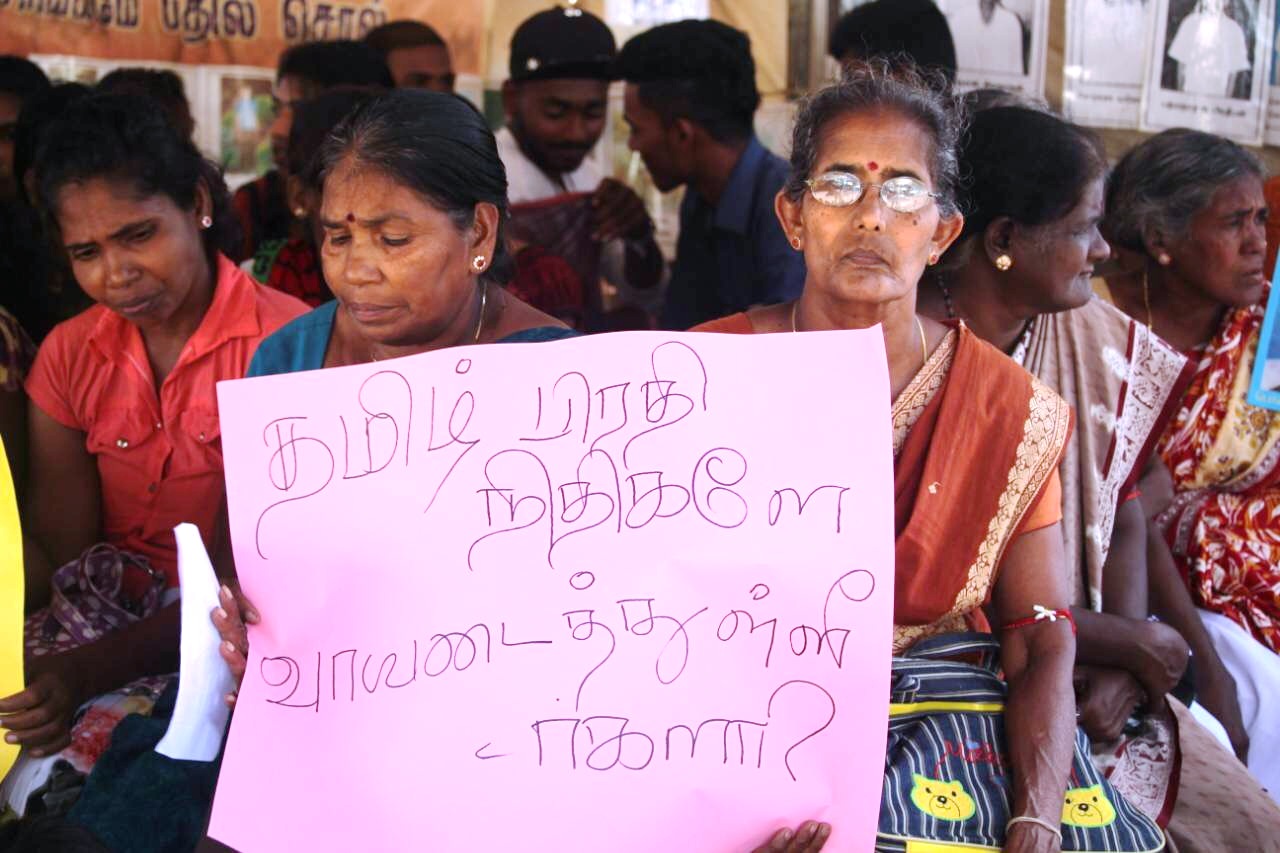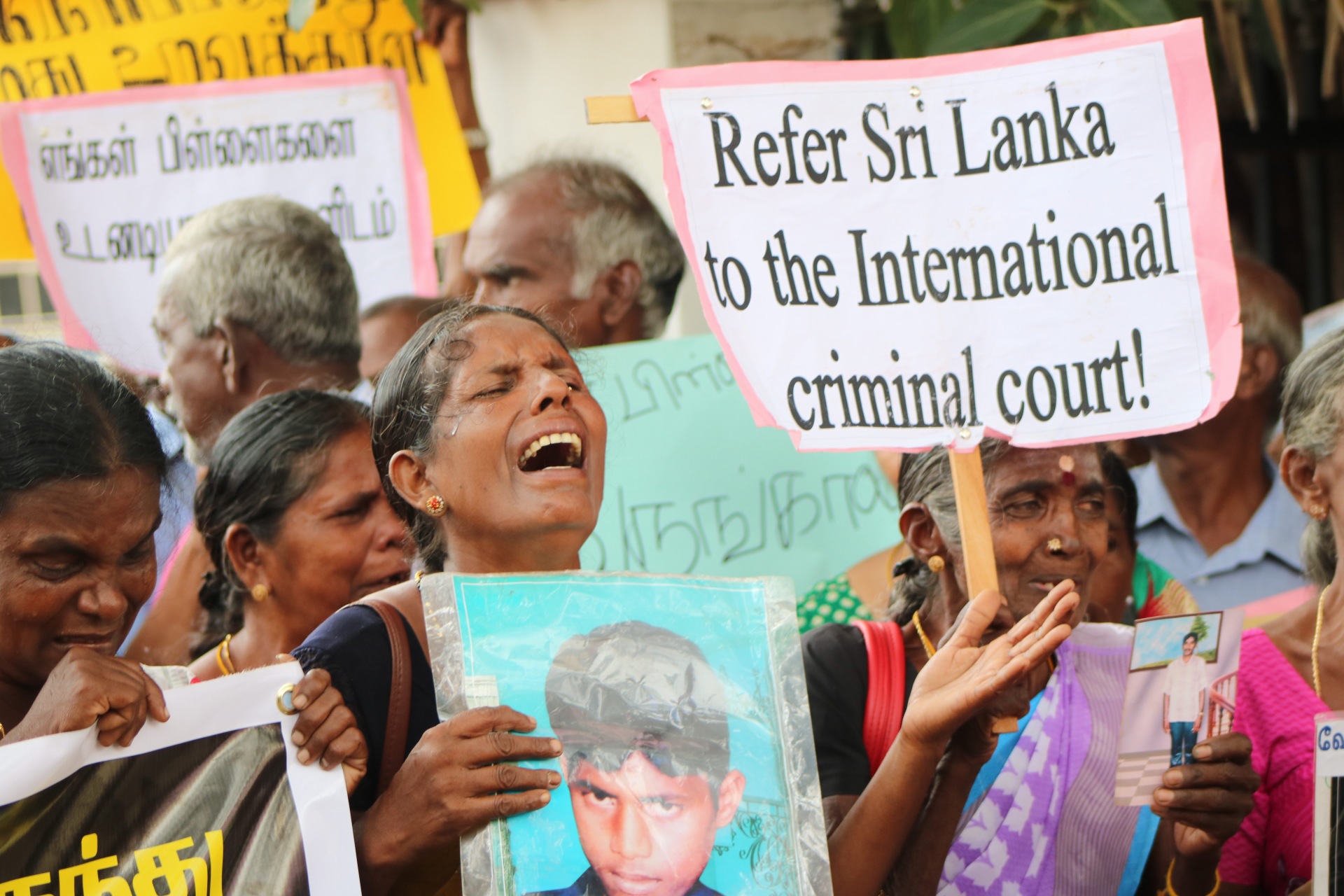
As Sri Lankan Prime Minister Harini Amarasuriya becomes the latest government figure to continue backing failed domestic accountability mechanisms for enforced disappearances, whilst Tamils continue to demand international action, we take a look at one of Sri Lanka's longest standing commissions - the Office on Missing Persons (OMP).
It has yet to find a single forcibly disappeared Tamil, identify a single perpetrator or account for a single crime.
Inception and initial criticism
The Office on Missing Persons (OMP) was formally established in 2017, but talk about setting up the office had come in 2016, under the then so-called ‘good governance’ government of Maithripala Sirisena and Ranil Wickremesinghe.
Even at its inception, Tamil leaders and families of the disappeared voiced concerns, especially given the decades of commissions that had already been set up by the Sri Lankan government.
In July 2017, Northern Province Chief Minister C.V. Wigneswaran told a visiting diplomat that he believed the OMP was unlikely to be effectively implemented. Tamil families, who had already been protesting for answers, saw early promises go unfulfilled – Sirisena’s government had failed to deliver basic information (like lists of surrendees) despite pledges made when creating the OMP. From the outset, many Tamil families felt “none of our expectations were fulfilled” by the OMP’s design, as their input during consultations was ignored.
Boycott calls gather momentum
When the OMP began operating and holding hearings in the North-East, Tamil families responded with protests and boycotts. In July 2018, mothers of the disappeared in Jaffna and Kilinochchi publicly refused to participate in OMP proceedings, laying out detailed reasons in an open letter. They criticized the OMP’s composition and independence, pointing out “no transparency” in how commissioners were appointed (the selections were made by a Colombo-led council that included Sinhala politicians who vowed to shield the military). Notably, one OMP commissioner was a former senior military officer, which families found unacceptable – “How can we seek justice from him?” the mothers asked. They also protested that calls to include international experts in the OMP were rejected, leaving them with little confidence in yet another domestic commission given Sri Lanka’s long history of failed inquiries.

"Tamil representatives is your mouth shut?" reads banner held by mother protesting over her missing child
At the same time, these families expressed frustration with their own elected Tamil representatives: protest banners in 2018 even accused Tamil MPs of inaction. Mothers condemned the OMP as lacking independence, faulting Tamil politicians for remaining silent while a compromised mechanism (stacked with a military figure) was put in place. In short, within a year of its launch, the OMP faced open rejection by the very victims it was meant to serve – many families refused to engage with what they saw as a biased, state-controlled process.
Growing international critique
As the OMP’s tenure wore on, criticism over its lack of progress intensified. By 2019 – two years into operations – the office had yet to produce a single tangible result (a fact later acknowledged by the UN). Tamil family networks report that in 2019 they even presented the OMP with evidence on a few emblematic disappearance cases, challenging the office to solve just one case in a few months to earn their trust. “Three years on [since then]…the families have only received an acknowledgement” and nothing more, one activists’ leader, Leeladevi Anandanadarajah, told the Tamil Guardian. Such inaction led families to conclude “no further example [is] needed to prove that the OMP is an inactive mechanism.”
Tamil diaspora organisations and human rights advocates echoed these criticisms. In September 2021, the US-based advocacy group PEARL (People for Equality and Relief in Lanka) marked the UN’s Disappearances Day with a statement highlighting that Tamil families “have rejected [the OMP] for its repeated failures and lack of progress in providing justice.”
Despite the government’s promises when forming the OMP in 2017, families still had no answers about their missing loved ones. PEARL and others asserted it had become “abundantly clear” that accountability “will not come from the state” via bodies like the OMP. Instead, they joined Tamil families in urging international mechanisms since domestic ones were seen as evasion and delay tactics.
UN officials join the condemnation
By 2022, even international officials candidly assessed the OMP’s failure. The UN High Commissioner for Human Rights reported to the Human Rights Council that the OMP “has not been able to trace a single disappeared person or clarify the fate of the disappeared in meaningful ways.” Instead of delivering truth, it appeared geared toward administrative closure.
UN High Commissioner Michelle Bachelet found that the policy of the Office of Missing Persons “seems to be aimed at reducing the case load and closing files rather than a comprehensive approach to establish the truth and ensure justice and redress to families.”
These damning observations from the UN underscored what families had been saying for years – the OMP had produced zero answers.
In September 2022, representatives of the Tamil Families of the Disappeared took their message directly to Geneva. At the UNHRC session, activists like Leeladevi Anandanadarajah and Thambirasa Selvarani stressed to Tamil Guardian their complete lack of confidence in the OMP. They recounted how from the very start they opposed the OMP Act, as its provisions ignored the victims’ proposals and “none of [their] expectations were fulfilled” in the final law. “We even have a problem with the name ‘Office of Missing Persons’,” Leeladevi said, arguing it downplays state culpability – “Our children did not go missing on their own. They were victims of enforced disappearances.”
After years of road-side protests (by late 2022 they had been protesting 2,000+ days continuously), not one demand was met and not one case solved. The families branded the OMP plainly as “an inactive mechanism” that exists only on paper. They begged the international community not to be deceived by calls to “re-energise” the OMP, since in their view the institution was beyond repair.
'The OMP is a sham'
.jpg)
Family members pelted photos of Tamil politicians with tomatoes, 2022.
On the ground across the Tamil homeland, Tamil families continued to protest and even expanded their criticism to political enablers. In December 2022, after 2,120 days of continuous protest, Tamil families in Vavuniya held a rally where they pelted photos of Tamil MPs with tomatoes – a show of anger at politicians engaging with the Colombo government on this issue. They felt such meetings only lent credence to colossal failures like the OMP. At this rally, organisers slammed the OMP as “a sham” and repeated their demand for an international investigation instead.
Further fuelling criticism, the OMP’s own leadership made statements in 2022 that outraged Tamils. In October 2022, OMP Chairman Mahesh Katulanda (appointed under the Rajapaksa administration) gave a Reuters interview where he denied that any genocide occurred and claimed there was “no evidence” the thousands of Tamils who surrendered at war’s end were abducted by Sri Lankan forces. Instead, he deflected blame onto the LTTE. These remarks were met with anger and seen as confirming Tamil suspicions that the OMP is biased in favor of the state’s narrative. For many, the chairman’s open denial of Tamil suffering underscored why the OMP is viewed as a bad-faith mechanism.

Demonstration by Tamil families, 2021.
Tamil families have never relented in condemning the OMP. By March 2024, their roadside vigil surpassed 2,200 days. Marking this milestone, the Association of the Relatives of the Enforced Disappearances (representing 8 districts) issued a statement reiterating that Tamils have “no faith” in domestic mechanisms “such as the OMP, which they see as but another means of evasion.”
They appealed again for international justice, calling for Sri Lanka to be referred to the ICC, an indication that the Tamil protestors view the OMP as part of the problem, not the solution.
Tamil protestors in Mannar, 2024.
In mid-2024, the OMP (and government) attempted small measures – offering death certificates or meagre compensation – ostensibly to bring “closure.” These moves were resoundingly rejected by families, who saw them as attempts to brush the issue under the carpet. For example, in July 2024 a group of Tamil mothers in Mannar held signs reading “Our children’s lives are worth more [than Rs. 200,000]”, after the OMP offered about US $660 per family as reparations. Protesters in Mannar cried that even setting up the OMP had not brought the truth to light – “they have not done so [found the missing]; instead they are coming to give us compensation so they can force us to stay home”. The families chanted that they did not want hush-money or death certificates in lieu of answers, again urging formal international involvement.
.jpg)
Mullaitivu, August 2024.
A similar demonstration in Mullaitivu in August 2024 saw families publicly reject the government’s offer of death certificates for their disappeared loved ones. They questioned why the OMP was “in haste” to issue death certificates instead of investigating the disappearances. “If the death certificate is the answer to why our children are still missing, then who are the murderers?” the distraught parents demanded to know. They accused the OMP of trying to silence their protests with paperwork and a few hundred dollars, rather than pursuing justice. “We want an impartial international investigation to find out what happened to our children,” the families insisted, standing firm in the scorching sun with photos of their missing kin.
In October 2024, OMP officials including its chair visited the North to meet families – and they were met with anger. At a meeting in Mannar on 28 October 2024, Tamil families and civil society representatives told the OMP to its face that “no constructive action” had been taken by the office since its founding. The families presented OMP officials (among them OMP Chairman Thambiaiah Yogarajah) with a dossier of over 300 disappearance cases complete with details and photographs – information the families had painstakingly compiled on their own. Despite having all this evidence in hand, the OMP had not meaningfully investigated a single case, they charged. Community representatives at the meeting reiterated their deep mistrust, noting bitterly that the OMP has “not revealed the fate of any forcibly disappeared people” even though it has been in operation since 2017.
This direct encounter ended with families again calling for international intervention, as domestic avenues (embodied by the OMP) have yielded nothing.
To date, no such international intervention has been allowed to take place, with even the current Sri Lankan government refusing to comply with UN resolutions demanding international accountability.

.JPG)